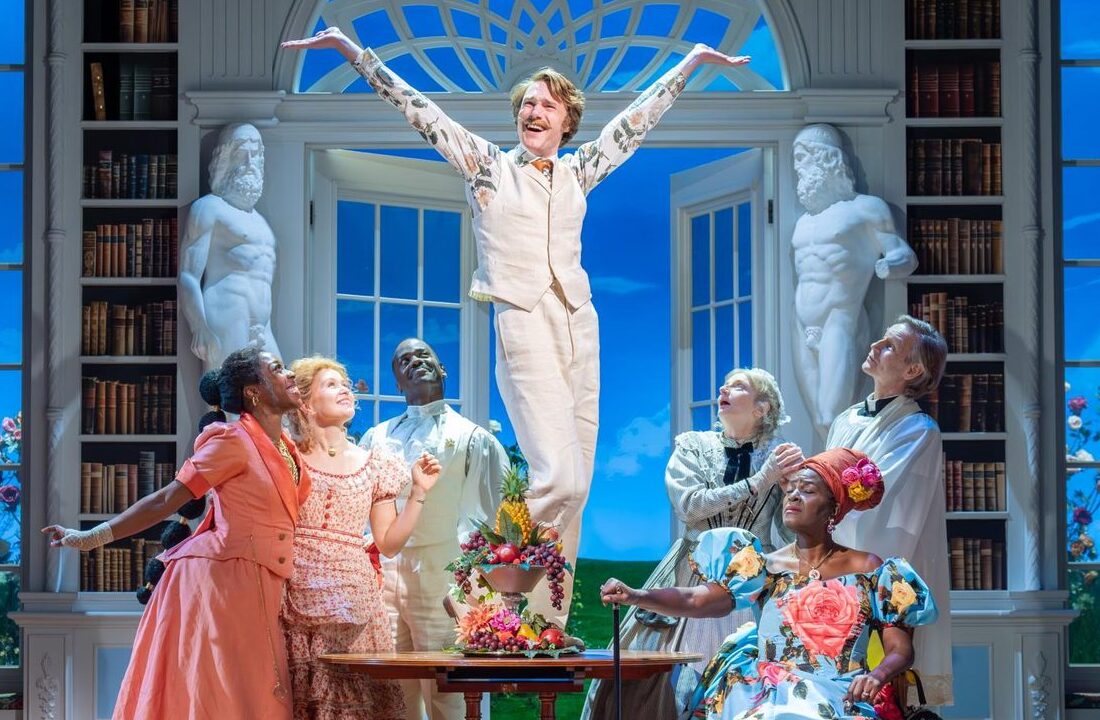When the opening scene of a production of The Importance of Being Earnest reveals a well-muscled man begowned in a shocking pink frock sensuously stroking a piano, you know the evening ahead won’t be your father’s Oscar Wilde. The National Theatre’s production, directed by Max Webster, features actors such as Ncuti Gatwa, Sharon D. Clarke, and Hugh Skinner, so the run presumably sold strongly even before it opened.
Wilde’s work was first produced in 1895 just months before the playwright was convicted of “gross indecency” in a libel case brought by the Marquess of Queensberry, the father of Wilde’s lover, Lord Alfred Douglas. The play is a British classic that must be familiar to almost every audience. Its two main characters, Algernon (Gatwa) and Earnest (Skinner), have both fabricated elaborate double lives, thus echoing the duplicity of Wilde’s own cloaked homosexuality. The characters use wit and language either to uphold or subvert social convention. Social norms are turned on their heads or manipulated, as need be. At one point, Lady Bracknell (the enchanting Sharon D. Clarke) comments that Earnest’s London townhouse is on the unfashionable side of the street, but both the fashion and the side can be changed, if necessary. Wilde’s characters can employ almost any device as a weapon in the service of social ambition, whether it is a cucumber sandwich, a birth certificate, or a scandalous entry in one’s diary.
Wilde’s characters crave to act out their salacious urges, but can’t because they are suppressed by the rules of polite society. It is Wilde’s masterful juxtaposition of language with desire that gives the play its depth and fuels the comedy. Webster, counterintuitively, allows his characters free reign to vamp with libidinous abandon. They overtly frolic and cavort, and although amusing, it erases the play’s carefully layered subtext and its subversive humour. In scenes that should bristle with complexity between what is said and what is meant, the play’s nuanced double-entendres are instead brazenly telegraphed to the audience through camp gestures and overdramatic reactions. At one point, Gwendolyn (Ronkẹ Adékọluẹ́jọ́) is caught with her body half way up the skirt of Cecily (Eliza Scanlen), which makes no sense in terms of the plot or characterisation. Actors hum contemporary tunes, or ad-lib asides such as “I have to eat so much damned bread in this production”, or “We’ve talked long enough to cover the scene change”. If these were the only aspects of the production that deviated from Wilde’s careful balancing act, it might have added a fun updating to the production.
There are wonderful exceptions, particularly Sharon D. Clarke as Lady Bracknell, who must overcome the legacy of delivering the word “handbag” memorably throated in a three-octave cadence by Dame Edith Evans. Clarke gives Lady Bracknell a Jamaican accent and a steely core. Julian Bleach also finds the right balance in his comic portrayal of two very different manservants. And Eliza Scanlen is both country innocence and street-wise sophisticated as Cecily.
The set is ablaze in vivid pastel colours and the costumes match the springtime brightness – both are a total delight by Rae Smith. The large National stage has been repurposed into a smaller size to accommodate a drawing room farce, which works to make the play feel more intimate. The costumes for the curtain call were right out of the Rio Carnival, without any purpose, it seemed to me.
In principle, I do not balk at modernisations or mash-ups of old classics, as long as it illuminates meaning, or helps me appreciate some hitherto under-developed aspect of the script. But when an essential element is stripped away, I wonder why and can feel short-changed, or in this case just flat. Given the audience’s reaction, however, I was an outlier in my reactions, as the other theatregoers were clearly totally enthralled with the energetic production.
Runs 2 ½ hours with interval
By: Oscar Wilde
Director: Max Webster
Cast includes: Ronkẹ Adékọluẹ́jọ́, Julian Bleach, Sharon D. Clarke, Ncuti Gatwa, , Eliza Scanlen, Hugh Skinner
Set and costume design: Rae Smith

